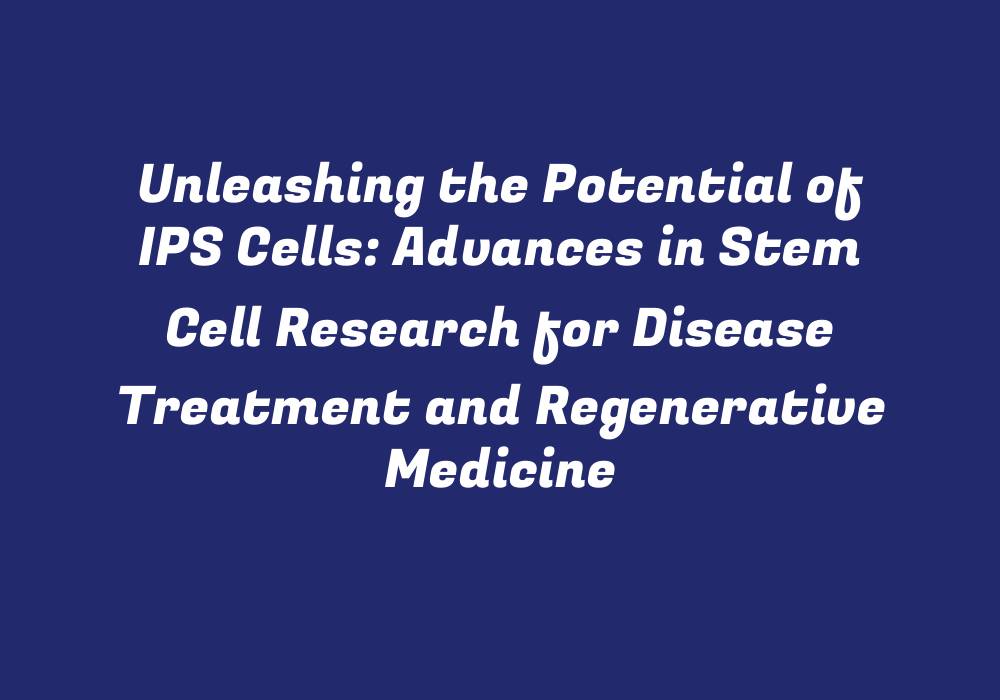Unleashing the Potential of IPS Cells: Advances in Stem Cell Research for Disease Treatment and Regenerative Medicine
In recent years, scientific advancements have paved the way for new medical breakthroughs. One area that has garnered significant attention is the study of Induced Pluripotent Stem Cells (IPS cells). These remarkable cells offer a unique opportunity to treat diseases and promote tissue regeneration through their ability to transform into different types of cells in the body.
What are IPS Cells?
IPS cells represent an innovative approach to stem cell research. While embryonic stem (ES) cells have been widely studied, there is some controversy surrounding their usage because they can only be obtained from human embryos. On the other hand, IPS cells are derived from adult cells like skin or blood, and scientists can reprogram them using genetic engineering techniques to create a cell with almost identical properties to an ES cell.
Applications in Disease Treatment
IPS cells have the potential to revolutionize medicine by offering new therapies for various diseases. For instance, they can be utilized to generate different types of cells that can then be used as a source of tissue transplantation or organ replacement. This approach is particularly useful when dealing with rare genetic disorders such as cystic fibrosis or Huntington’s disease, as it eliminates the need for patients to rely on donated organs with limited availability.
Regenerative Medicine and Tissue Engineering
Another area where IPS cells are showing great promise is in regenerative medicine. This field focuses on the development of therapies that can restore or replace damaged tissues, organs, or body parts. Using IPS cells, scientists can grow these replacement tissues in a controlled environment before transplanting them back into patients to treat various conditions.
Addressing Ethical Concerns
Although the use of IPS cells holds tremendous potential for improving human health, it is essential to address ethical concerns regarding their application. A primary concern relates to the source material needed for generating IPS cells – adult cells derived from skin or blood samples. Obtaining these samples may raise privacy and informed consent issues, particularly when they are obtained without patient knowledge. To minimize such risks, researchers must ensure that proper procedures and ethical guidelines are followed throughout the research process.
Future Directions
Despite ongoing advancements in stem cell research, more work is required to fully realize the potential of IPS cells. Further study will be needed to develop better methods for controlling the differentiation process and optimizing the efficiency of cell reprogramming. Additionally, significant investments in research infrastructure are necessary to support the production of high-quality IPS cells that meet strict quality control standards. In this context, collaborations between governmental organizations, pharmaceutical companies, academic institutions, and nonprofit research centers can help foster a more comprehensive approach to addressing current challenges.
Conclusion
In conclusion, the use of IPS cells represents a promising step in the field of stem cell research. Their ability to be derived from adult tissue samples while retaining the versatility and regenerative potential of ES cells sets them apart as a unique resource for treating various diseases and promoting tissue regeneration. However, it is crucial that these advancements are pursued ethically and responsibly to ensure the benefits reach as many patients as possible. By working towards improved research and understanding of IPS cell applications, scientists can better address current healthcare challenges and create a brighter future for individuals suffering from debilitating conditions.
